Search Result
Results for "
renal injury
" in MedChemExpress (MCE) Product Catalog:
2
Isotope-Labeled Compounds
| Cat. No. |
Product Name |
Target |
Research Areas |
Chemical Structure |
-
- HY-125923
-
|
|
Others
|
Metabolic Disease
|
|
Djenkolic acid is a sulfur-containing non-protein amino acid naturally found in the djenkol beans of the Southeast Asian plant Archidendron jiringa. Djenkolic Acid often causes renal injury, including hypersensitivity to or a direct toxic effect of a djenkol bean metabolite, resulting in acute kidney injury and/or urinary tract obstruction by djenkolic acid crystals, sludge, and/or possible ureteral spasms .
|
-
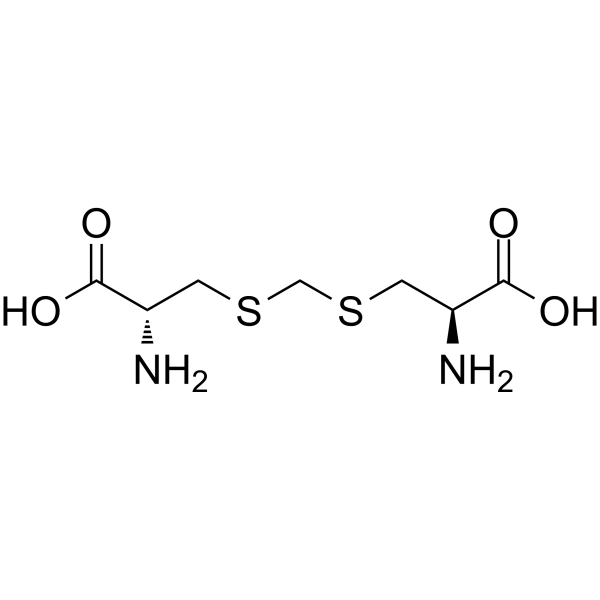
-
- HY-B1472
-
|
11-Deoxycorticosterone acetate; DOC acetate; Cortexone acetate
|
Mineralocorticoid Receptor
Endogenous Metabolite
|
Endocrinology
|
|
Deoxycorticosterone acetate (DOCA) is an adrenocortin, acts as a precursor to aldosterone. Deoxycorticosterone acetate is a mineralocorticoid receptor agonist. Deoxycorticosterone acetate can cause severe renal injury, including inflammation, fibrosis, glomerular damage, and proteinuria .
|
-
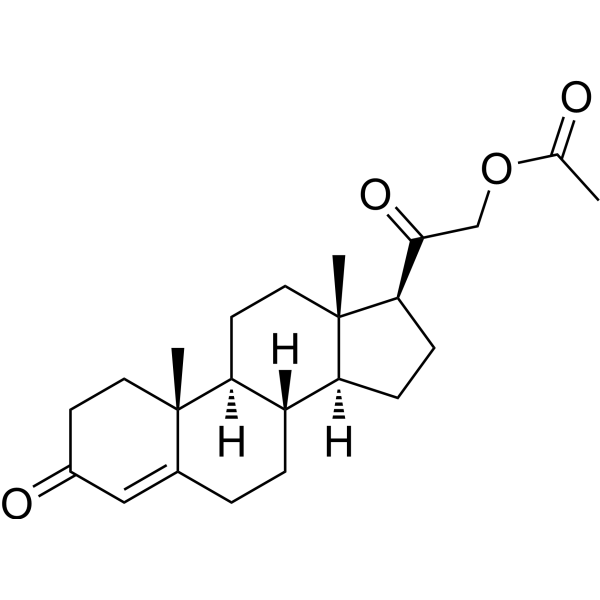
-
- HY-112597A
-
|
REN001; HPP593
|
PPAR
|
Inflammation/Immunology
|
|
Mavodelpar (REN001) is a selective PPARδ agonist. Mavodelpar suppresses glomerular injury and renal fibrosis. Mavodelpar can be used for the research of primary mitochondrial myopathies (PMM) and long-chain fatty acid oxidation disorders (LC-FAOD) . Mavodelpar is a click chemistry reagent, it contains an Alkyne group and can undergo copper-catalyzed azide-alkyne cycloaddition (CuAAc) with molecules containing Azide groups.
|
-
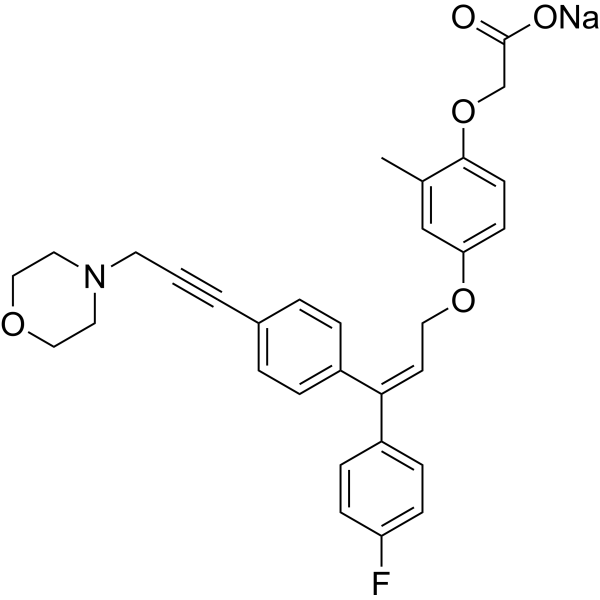
-
- HY-42682
-
|
D-Galactosamine hydrochloride
|
Others
|
Inflammation/Immunology
|
|
D(+)-Galactosamine (D-Galactosamine) hydrochloride, which is an established experimental toxin, primarily causes liver injury by the generation of free radicals and depletion of UTP nucleotides. D(+)-Galactosamine hydrochloride intoxication also induces renal dysfunction thus, renal failure is often associated with the end-stage of the liver damage. Lipopolysaccharide/D(+)-Galactosamine-induced acute liver injury is a known animal model of fulminant hepatic failure .
|
-
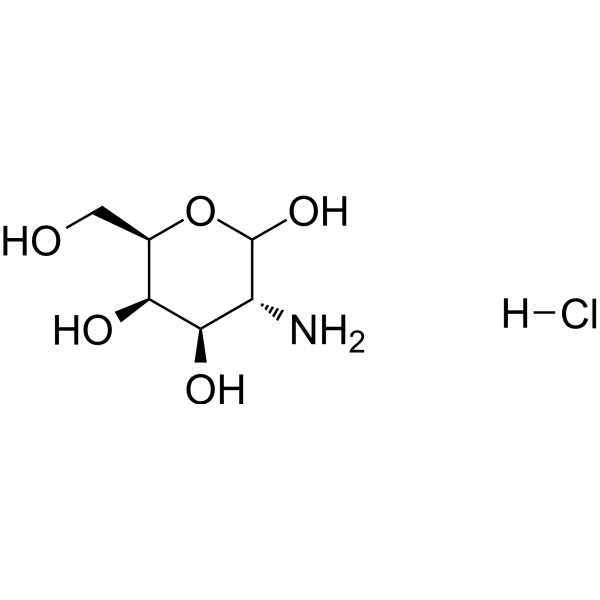
-
- HY-151342
-
|
|
Others
|
Others
|
|
Ser@TPP@CUR is a Curcumin (HY-N0005) derivative. Ser@TPP@CUR effectively ameliorates injured renal tubular epithelial cells and improves renal functions of acute kidney injury (AKI) mice. Ser@TPP@CUR can be used for the research of AKI .
|
-
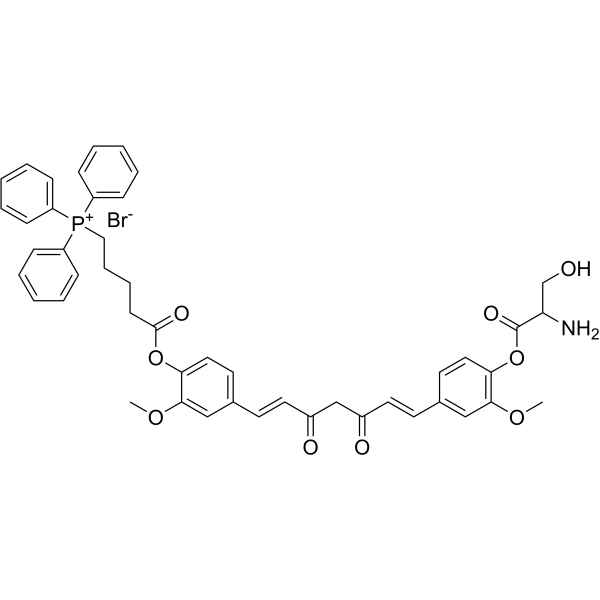
-
- HY-P0125
-
-
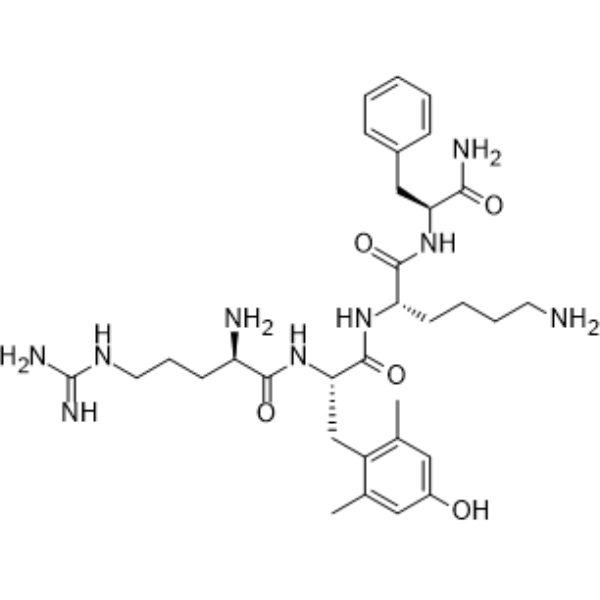
-
- HY-135430
-
|
|
Ferroptosis
|
Inflammation/Immunology
|
|
SRS16-86 is a potent inhibitor of ferroptosis . SRS16-86 is more stable than more stable to metabolism and plasma than Ferrostatin-1 in vivo. SRS16-86 can be used for renal ischemia-reperfusion injury (IRI) and spinal cord injury (SCI) research .
|
-
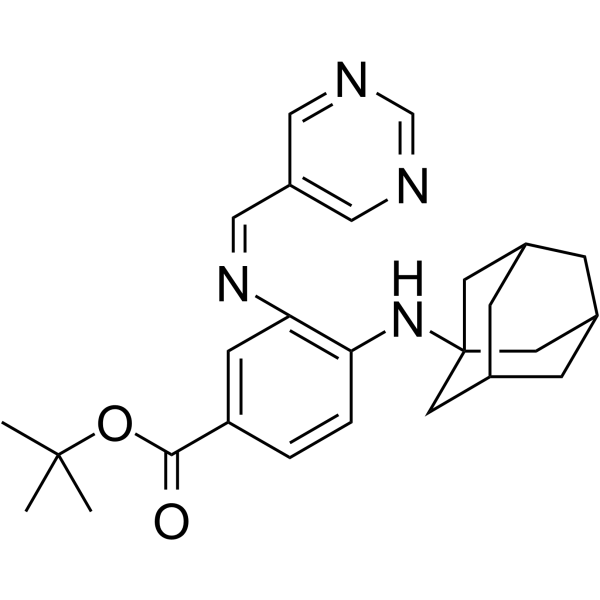
-
- HY-N0625A
-
|
|
|
|
|
Alpinetin is a flavonoid isolated from cardamom and has anti-inflammatory activity. Alpinetin inhibits lipopolysaccharide (LPS)-induced inflammation, activates PPAR-γ, activates Nrf2, and inhibits TLR4 expression to protect LPS-induced renal injury .
|
-
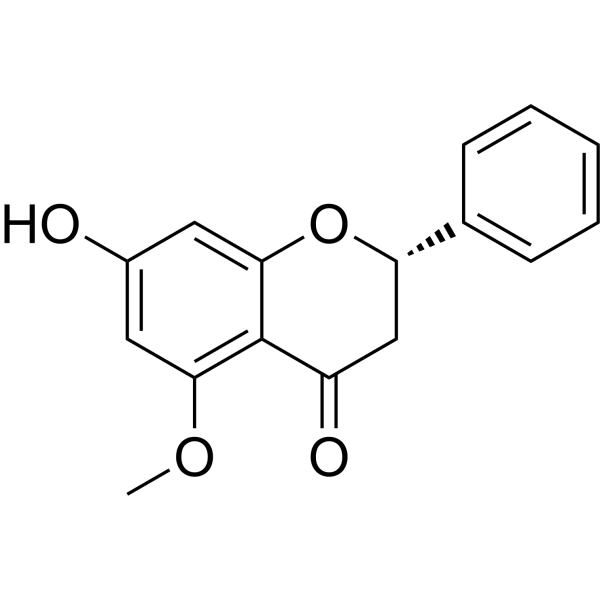
-
- HY-B1472R
-
|
11-Deoxycorticosterone acetate(Standard); DOC acetate(Standard); Cortexone acetate (Standard)
|
Mineralocorticoid Receptor
Endogenous Metabolite
|
Endocrinology
|
|
Deoxycorticosterone acetate (Standard) is the analytical standard of Deoxycorticosterone acetate. This product is intended for research and analytical applications. Deoxycorticosterone acetate (DOCA) is an adrenocortin, acts as a precursor to aldosterone. Deoxycorticosterone acetate is a mineralocorticoid receptor agonist. Deoxycorticosterone acetate can cause severe renal injury, including inflammation, fibrosis, glomerular damage, and proteinuria .
|
-
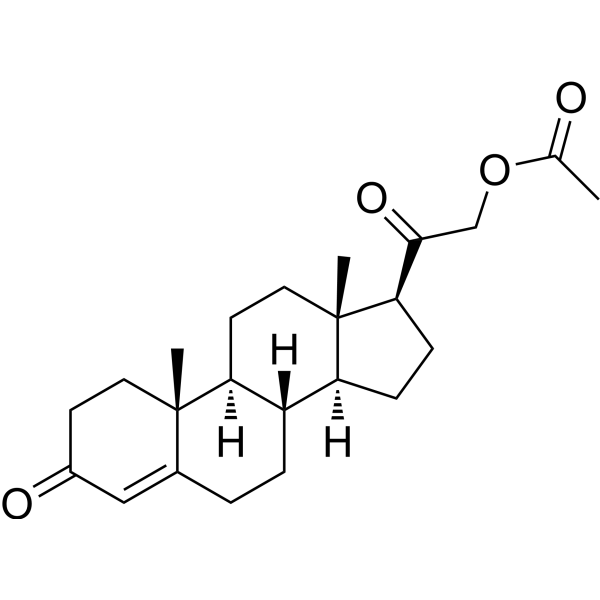
-
- HY-10450
-
|
BMS-512148
|
SGLT
|
Metabolic Disease
Cancer
|
|
Dapagliflozin (BMS-512148), a new type of agent used to treat diabetes mellitus (DM), is a competitive sodium/glucose cotransporter 2 (SGLT2) inhibitor, which results in excretion of glucose into the urine . Dapagliflozin induces HIF1 expression and attenuates renal IR injury .
|
-
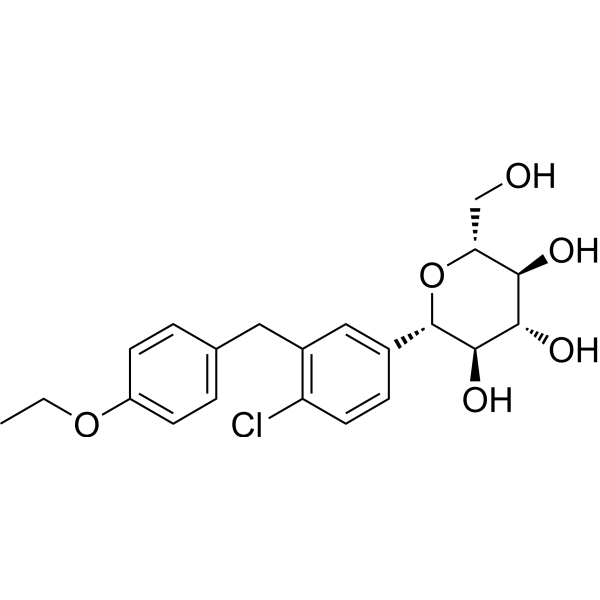
-
- HY-P0125B
-
|
MTP-131 triacetate; RX-31 triacetate; SS-31 triacetate
|
Mitochondrial Metabolism
|
Cardiovascular Disease
Neurological Disease
Inflammation/Immunology
|
|
Elamipretide triacetate (MTP-131 triacetate; RX-31 triacetate; SS-31 triacetate) is Elamipretide triacetate form of Elamipretide (HY-P0125). Elamipretide triacetate is a mitochondria-targeting peptide, which ameliorates myocardial infarction, improves the renal function and protects neurons form inflammatory and oxidative stress injury .
|
-
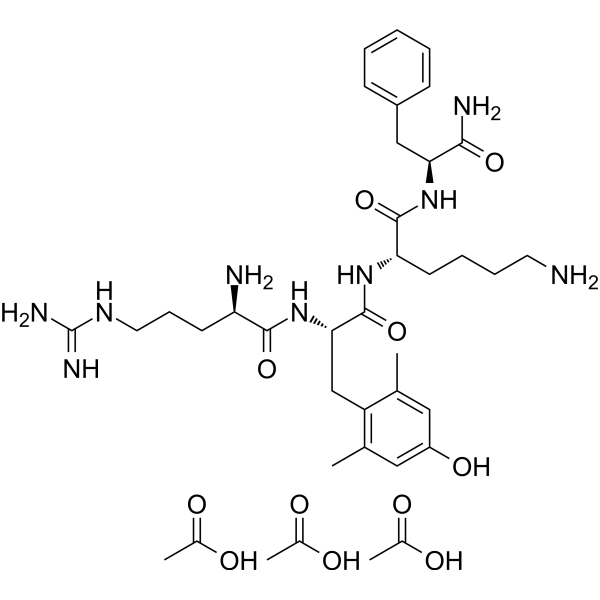
-
- HY-P0125A
-
-
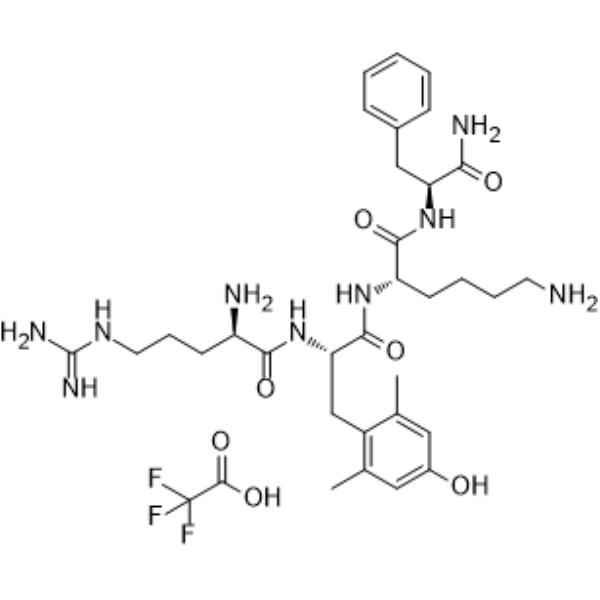
-
- HY-160186
-
|
|
Others
|
Cardiovascular Disease
|
|
20-SOLA is the first water soluble and orally active 20-HETE antagonist. 20-SOLA greatly ameliorates changes in blood pressure and renal injury associated with a streptozotocin (STZ)-diabetic mouse model. 20-SOLA also is a GPR75 receptor blocker. 20-SOLA can be used for the research of cardiovascular pathologies .
|
-
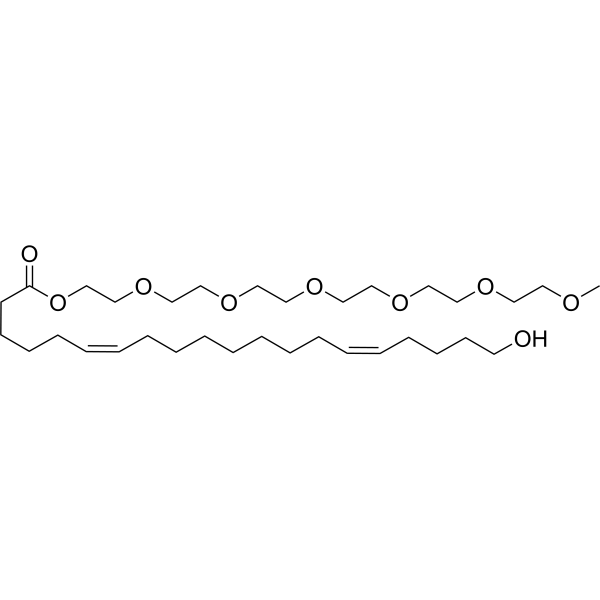
-
- HY-107818
-
|
|
NF-κB
|
Cardiovascular Disease
Inflammation/Immunology
|
|
4-Hydroxychalcone is a chalcone metabolite with anti-angiogenic and anti-inflammatory activities. 4-Hydroxychalcone suppresses angiogenesis by suppression of growth factor pathway with no signs of cytotoxicity . 4-Hydroxychalcone inhibits TNF-α induced NF-κB pathway activation and activates BMP signaling, reduces resistant hypertension (RH) by attenuating hyperaldosteronism and renal injury in mice .
|
-
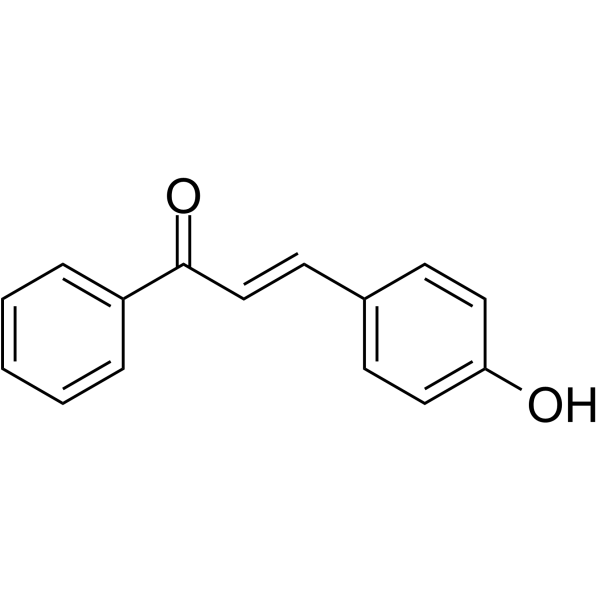
-
- HY-155463
-
|
|
NOD-like Receptor (NLR)
Interleukin Related
|
Inflammation/Immunology
|
|
NLRP3-IN-25 (compound 32) is an orally available NLRP3 inhibitor with anti-inflammatory activity. NLRP3-IN-25 attenuates renal injury in doxorubicin-induced glomerulonephritis in mice. NLRP3-IN-25 inhibits IL-1β secretion in THP-1 cells with an IC50 of 21 nM .
|
-
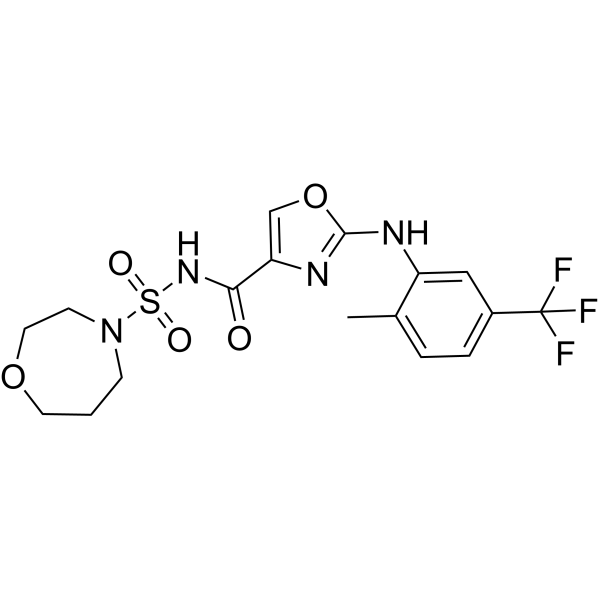
-
- HY-149426
-
|
|
Sirtuin
|
Inflammation/Immunology
|
|
SIRT5 inhibitor 7 (compound 58) is a substrate-competitive and selective SIRT5 inhibitor with anti-inflammatory activity. SIRT5 inhibitor 7 has renal protective effects and regulates protein succinylation and the release of pro-inflammatory cytokines. SIRT5 inhibitor 7 has in vivo activity in AKI mouse models of lipopolysaccharide (LPS) and cecal ligation/perforation (CLP)-induced sepsis-related acute kidney injury .
|
-
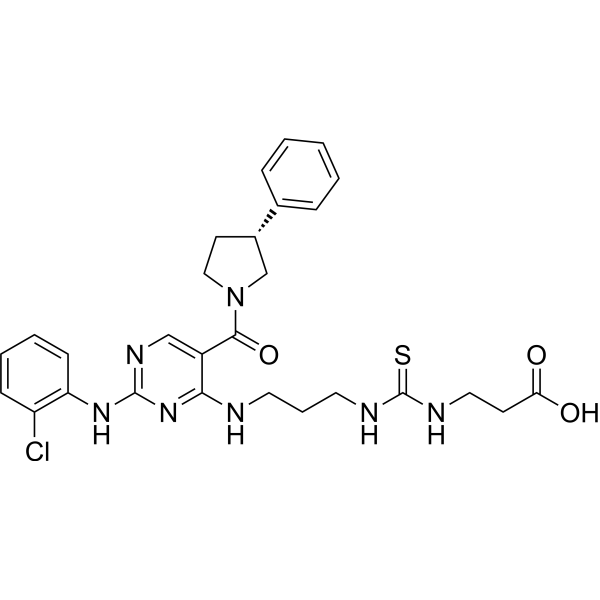
-
- HY-107544
-
|
|
PKA
|
Metabolic Disease
|
|
8-pCPT-2'-O-Me-cAMP-AM is a cyclic AMP analogue, selectively activates Epac-Rap signaling pathway. 8-pCPT-2'-O-Me-cAMP-AM protects renal function by activating Epac from ischemia injury. 8-pCPT-2'-O-Me-cAMP-AM also stimulates insulin secretion by interaction with PKA pathway .
|
-
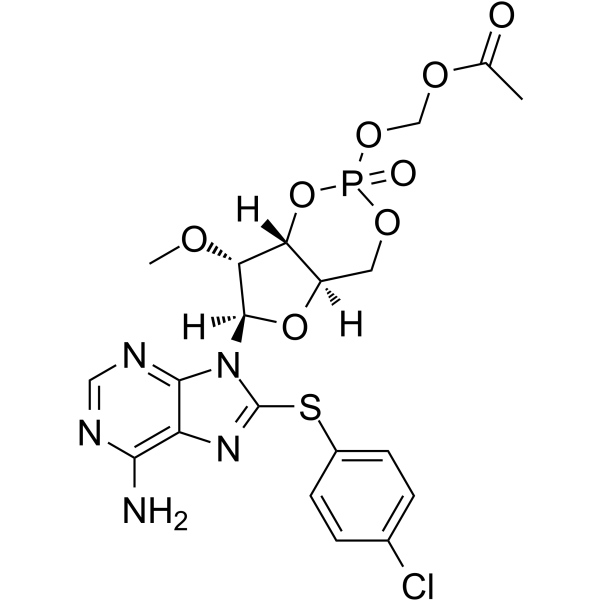
-
- HY-10450A
-
|
BMS-512148 (2S)-1,2-propanediol, hydrate
|
SGLT
|
Metabolic Disease
Cancer
|
|
Dapagliflozin ((2S)-1,2-propanediol, hydrate) is the S-enantiomer of Dapagliflozin 1,2-propanediol, hydrate. Dapagliflozin ((2S)-1,2-propanediol, hydrate), a new type of agent used to treat diabetes mellitus (DM), is a competitive sodium/glucose cotransporter 2 (SGLT2) inhibitor, which results in excretion of glucose into the urine . Dapagliflozin ((2S)-1,2-propanediol, hydrate) induces HIF1 expression and attenuates renal IR injury .
|
-
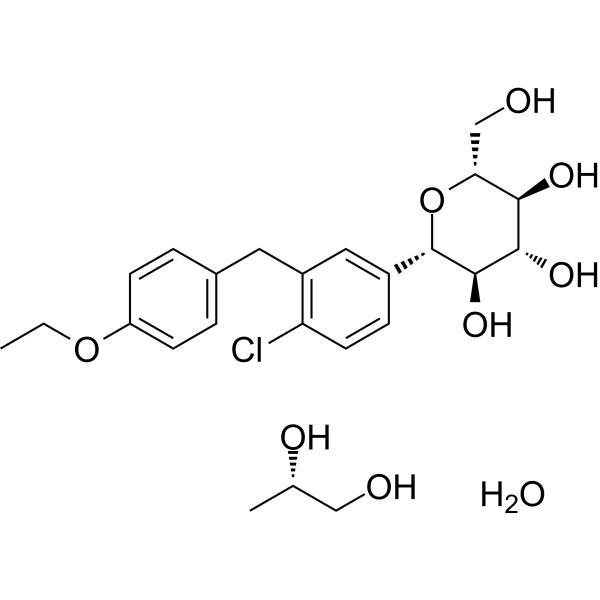
-
- HY-P99765
-
|
anti-LFA1
|
Integrin
|
Inflammation/Immunology
|
|
Odulimomab (anti-LFA1) is an anti-LFA-1 monoclonal antibody. Odulimomab inhibits proliferation of T lymphocyte and shows protective effects against ischemia and reperfusion injury. Odulimomab can be used for the research of transplant rejection and immunological disease .
|
-

-
- HY-16561
-
Resveratrol
Maximum Cited Publications
77 Publications Verification
trans-Resveratrol; SRT501
|
IKK
Autophagy
Mitophagy
Sirtuin
Apoptosis
Bacterial
Fungal
Antibiotic
Keap1-Nrf2
|
Infection
Inflammation/Immunology
Cancer
|
|
Resveratrol (trans-Resveratrol; SRT501), a natural polyphenolic phytoalexin that possesses anti-oxidant, anti-inflammatory, cardioprotective, and anti-cancer properties. Resveratrol (SRT 501) has a wide spectrum of targets including mTOR, JAK, β-amyloid, Adenylyl cyclase, IKKβ, DNA polymerase. Resveratrol also is a specific SIRT1 activator . Resveratrol is a potent pregnane X receptor (PXR) inhibitor . Resveratrol is an Nrf2 activator, ameliorates aging-related progressive renal injury in mice model . Resveratrol increases production of NO in endothelial cells .
|
-
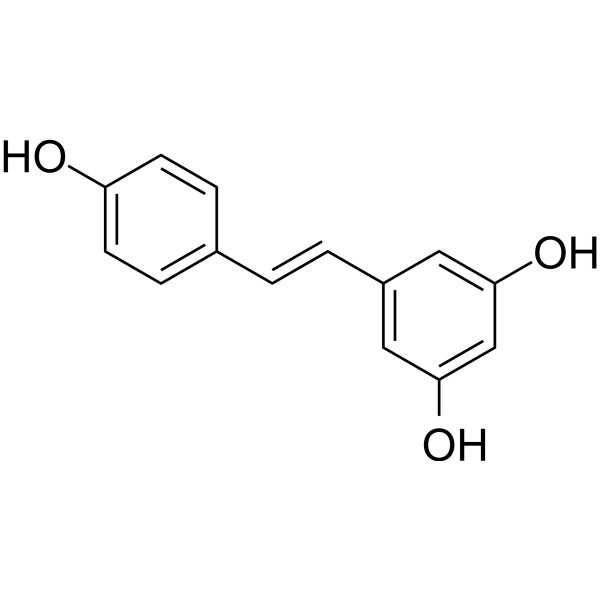
-
- HY-144332
-
|
|
HDAC
HIF/HIF Prolyl-Hydroxylase
|
Cancer
|
|
PHD2/HDACs-IN-1 is a potent PHD2/HDACs hybrid inhibitor (IC50s of 1.15 μM, 19.75 μM, 26.60 μM and 15.98 μM for PHD2, HDAC1, HDAC2 and HDAC6, respectively). PHD2/HDACs-IN-1 is a low-toxicity renoprotective agent for research of cisplatin-induced acute kidney injury (AKI) .
|
-
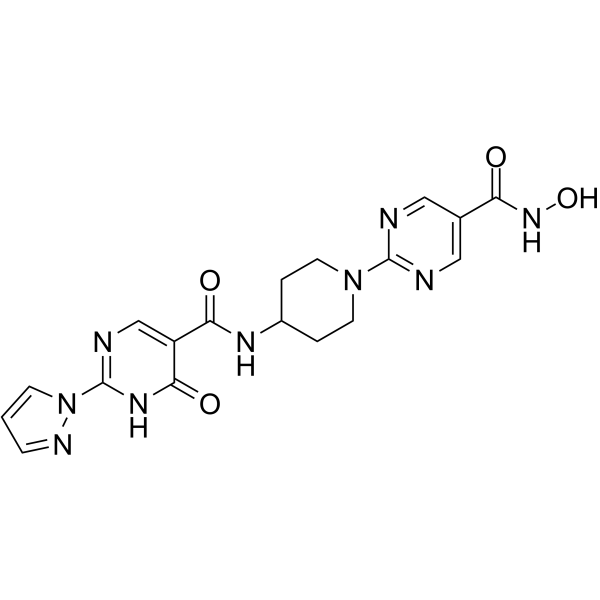
-
- HY-16561R
-
|
trans-Resveratrol (Standard); SRT501 (Standard)
|
IKK
Autophagy
Mitophagy
Sirtuin
Apoptosis
Bacterial
Fungal
Antibiotic
Keap1-Nrf2
|
Infection
Inflammation/Immunology
Cancer
|
|
Resveratrol (Standard) is the analytical standard of Resveratrol. This product is intended for research and analytical applications. Resveratrol (trans-Resveratrol; SRT501), a natural polyphenolic phytoalexin that possesses anti-oxidant, anti-inflammatory, cardioprotective, and anti-cancer properties. Resveratrol (SRT 501) has a wide spectrum of targets including mTOR, JAK, β-amyloid, Adenylyl cyclase, IKKβ, DNA polymerase. Resveratrol also is a specific SIRT1 activator . Resveratrol is a potent pregnane X receptor (PXR) inhibitor . Resveratrol is an Nrf2 activator, ameliorates aging-related progressive renal injury in mice model . Resveratrol increases production of NO in endothelial cells .
|
-
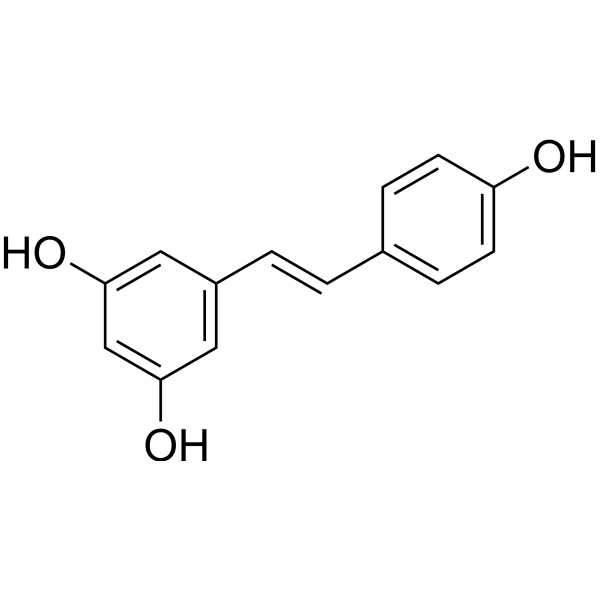
-
- HY-16561S1
-
|
trans-Resveratrol-13C6; SRT501-13C6
|
Isotope-Labeled Compounds
IKK
Autophagy
Mitophagy
Sirtuin
Apoptosis
Bacterial
Fungal
Antibiotic
Keap1-Nrf2
|
Infection
Inflammation/Immunology
Cancer
|
|
Resveratrol- 13C6 is the 13C-labeled Resveratrol. Resveratrol (trans-Resveratrol; SRT501), a natural polyphenolic phytoalexin that possesses anti-oxidant, anti-inflammatory, cardioprotective, and anti-cancer properties. Resveratrol (SRT 501) has a wide spectrum of targets including mTOR, JAK, β-amyloid, Adenylyl cyclase, IKKβ, DNA polymerase. Resveratrol also is a specific SIRT1 activator[1][2][3][4]. Resveratrol is a potent pregnane X receptor (PXR) inhibitor[5]. Resveratrol is an Nrf2 activator, ameliorates aging-related progressive renal injury in mice model[6]. Resveratrol increases production of NO in endothelial cells[7].
|
-
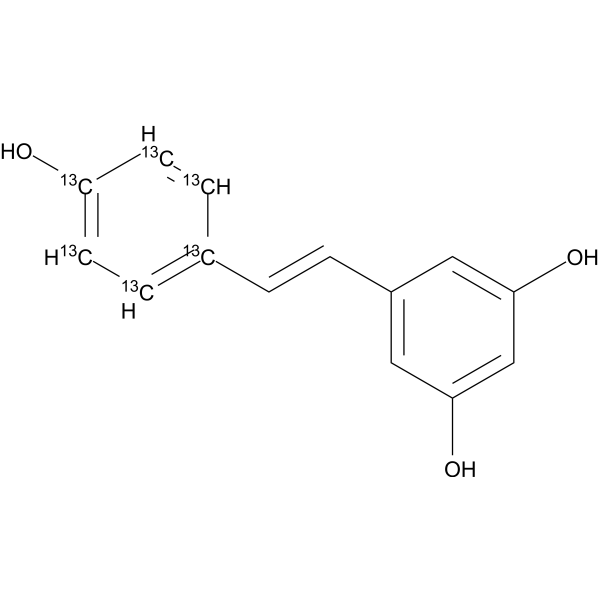
-
- HY-16561S
-
|
trans-Resveratrol-d4; SRT501-d4
|
Isotope-Labeled Compounds
IKK
Autophagy
Mitophagy
Sirtuin
Apoptosis
Bacterial
Fungal
Antibiotic
Keap1-Nrf2
|
Infection
Inflammation/Immunology
Cancer
|
|
Resveratrol-d4 is the deuterium labeled Resveratrol. Resveratrol (trans-Resveratrol; SRT501), a natural polyphenolic phytoalexin that possesses anti-oxidant, anti-inflammatory, cardioprotective, and anti-cancer properties. Resveratrol (SRT 501) has a wide spectrum of targets including mTOR, JAK, β-amyloid, Adenylyl cyclase, IKKβ, DNA polymerase. Resveratrol also is a specific SIRT1 activator[1][2][3][4]. Resveratrol is a potent pregnane X receptor (PXR) inhibitor[5]. Resveratrol is an Nrf2 activator, ameliorates aging-related progressive renal injury in mice model[6]. Resveratrol increases production of NO in endothelial cells[7].
|
-
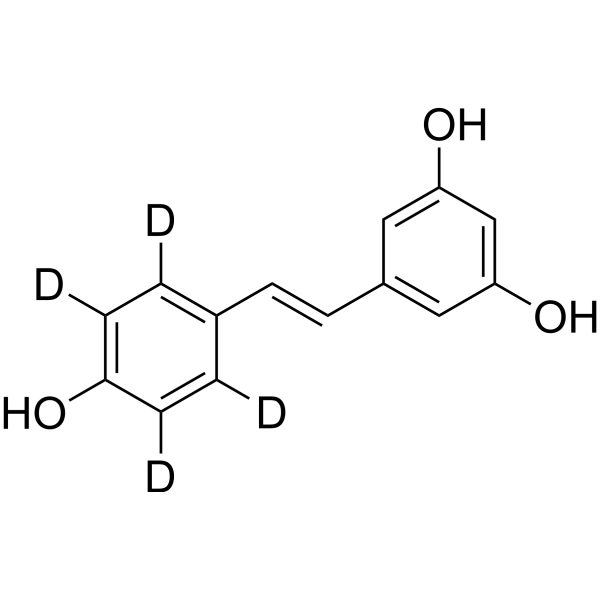
-
- HY-B0202
-
|
SR-47436; BMS-186295
|
Angiotensin Receptor
Apoptosis
|
Cardiovascular Disease
Endocrinology
|
|
Irbesartan (SR-47436) is an orally active Ang II type 1 (AT1) receptor blocker (ARB). Irbesartan can relax the blood vessels, low blood pressure and increase the supply of blood and oxygen to the heart. Irbesartan can be used for the research of high blood pressure, heart failure, and diabetic kidney disease .
|
-
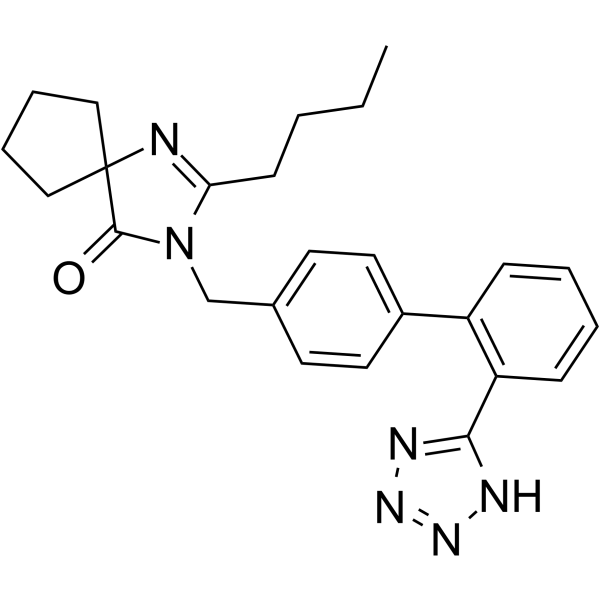
-
- HY-B0202A
-
|
SR-47436 hydrochloride; BMS-186295 hydrochloride
|
Angiotensin Receptor
Apoptosis
|
Neurological Disease
Metabolic Disease
|
|
Irbesartan (SR-47436) hydrochloride is an orally active Ang II type 1 (AT1) receptor blocker (ARB). Irbesartan hydrochloride can relax the blood vessels, low blood pressure and increase the supply of blood and oxygen to the heart. Irbesartan hydrochloride can be used for the research of high blood pressure, heart failure, and diabetic kidney disease .
|
-
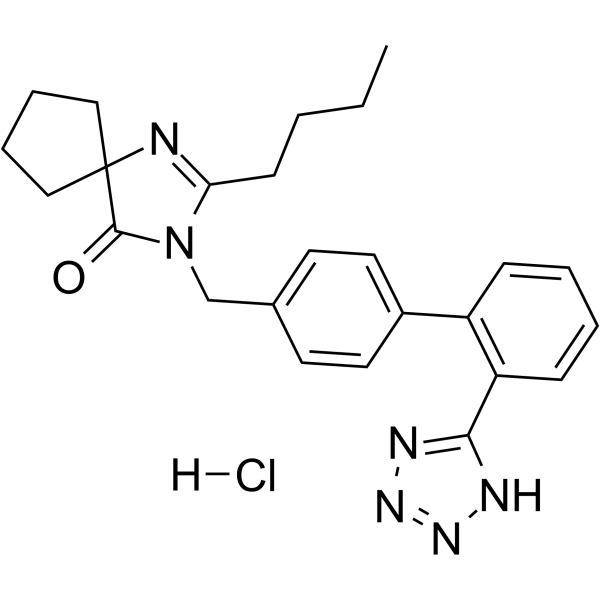
| Cat. No. |
Product Name |
Target |
Research Area |
| Cat. No. |
Product Name |
Target |
Research Area |
-
- HY-P99765
-
|
anti-LFA1
|
Integrin
|
Inflammation/Immunology
|
|
Odulimomab (anti-LFA1) is an anti-LFA-1 monoclonal antibody. Odulimomab inhibits proliferation of T lymphocyte and shows protective effects against ischemia and reperfusion injury. Odulimomab can be used for the research of transplant rejection and immunological disease .
|
| Cat. No. |
Product Name |
Category |
Target |
Chemical Structure |
-
- HY-125923
-
-

-
- HY-B1472
-
-

-
- HY-42682
-
-

-
- HY-B1472R
-
-

-
- HY-107818
-
-

-
- HY-16561
-
Resveratrol
Maximum Cited Publications
77 Publications Verification
trans-Resveratrol; SRT501
|
Structural Classification
Classification of Application Fields
Anti-aging
Source classification
Vitis vinifera cv. Zalema
Plants
Vitaceae
Infection
Microorganisms
Functional Molecules
Sunscreen
Research of Health Products
Phenols
Polyphenols
Cosmetic Research
Inflammation/Immunology
Disease Research Fields
Cancer
|
IKK
Autophagy
Mitophagy
Sirtuin
Apoptosis
Bacterial
Fungal
Antibiotic
Keap1-Nrf2
|
|
Resveratrol (trans-Resveratrol; SRT501), a natural polyphenolic phytoalexin that possesses anti-oxidant, anti-inflammatory, cardioprotective, and anti-cancer properties. Resveratrol (SRT 501) has a wide spectrum of targets including mTOR, JAK, β-amyloid, Adenylyl cyclase, IKKβ, DNA polymerase. Resveratrol also is a specific SIRT1 activator . Resveratrol is a potent pregnane X receptor (PXR) inhibitor . Resveratrol is an Nrf2 activator, ameliorates aging-related progressive renal injury in mice model . Resveratrol increases production of NO in endothelial cells .
|
-

-
- HY-16561R
-
|
trans-Resveratrol (Standard); SRT501 (Standard)
|
Infection
Functional Molecules
Classification of Application Fields
Sunscreen
Anti-aging
Source classification
Research of Health Products
Cosmetic Research
Plants
Inflammation/Immunology
Disease Research Fields
Cancer
|
IKK
Autophagy
Mitophagy
Sirtuin
Apoptosis
Bacterial
Fungal
Antibiotic
Keap1-Nrf2
|
|
Resveratrol (Standard) is the analytical standard of Resveratrol. This product is intended for research and analytical applications. Resveratrol (trans-Resveratrol; SRT501), a natural polyphenolic phytoalexin that possesses anti-oxidant, anti-inflammatory, cardioprotective, and anti-cancer properties. Resveratrol (SRT 501) has a wide spectrum of targets including mTOR, JAK, β-amyloid, Adenylyl cyclase, IKKβ, DNA polymerase. Resveratrol also is a specific SIRT1 activator . Resveratrol is a potent pregnane X receptor (PXR) inhibitor . Resveratrol is an Nrf2 activator, ameliorates aging-related progressive renal injury in mice model . Resveratrol increases production of NO in endothelial cells .
|
-

| Cat. No. |
Product Name |
Chemical Structure |
-
- HY-16561S
-
|
|
|
Resveratrol-d4 is the deuterium labeled Resveratrol. Resveratrol (trans-Resveratrol; SRT501), a natural polyphenolic phytoalexin that possesses anti-oxidant, anti-inflammatory, cardioprotective, and anti-cancer properties. Resveratrol (SRT 501) has a wide spectrum of targets including mTOR, JAK, β-amyloid, Adenylyl cyclase, IKKβ, DNA polymerase. Resveratrol also is a specific SIRT1 activator[1][2][3][4]. Resveratrol is a potent pregnane X receptor (PXR) inhibitor[5]. Resveratrol is an Nrf2 activator, ameliorates aging-related progressive renal injury in mice model[6]. Resveratrol increases production of NO in endothelial cells[7].
|
-

-
- HY-16561S1
-
|
|
|
Resveratrol- 13C6 is the 13C-labeled Resveratrol. Resveratrol (trans-Resveratrol; SRT501), a natural polyphenolic phytoalexin that possesses anti-oxidant, anti-inflammatory, cardioprotective, and anti-cancer properties. Resveratrol (SRT 501) has a wide spectrum of targets including mTOR, JAK, β-amyloid, Adenylyl cyclase, IKKβ, DNA polymerase. Resveratrol also is a specific SIRT1 activator[1][2][3][4]. Resveratrol is a potent pregnane X receptor (PXR) inhibitor[5]. Resveratrol is an Nrf2 activator, ameliorates aging-related progressive renal injury in mice model[6]. Resveratrol increases production of NO in endothelial cells[7].
|
-

Your information is safe with us. * Required Fields.
Inquiry Information
- Product Name:
- Cat. No.:
- Quantity:
- MCE Japan Authorized Agent:


































